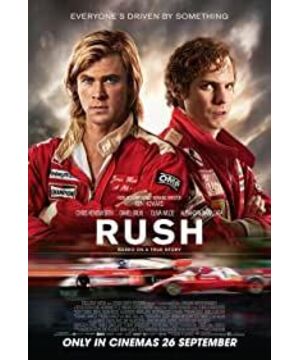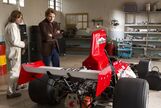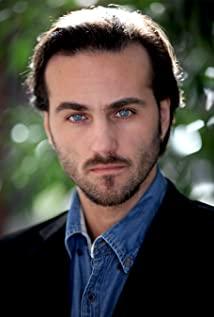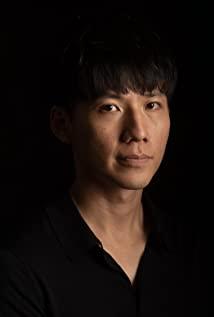Biographical films are easy to make boring. For example, the biography of Jobs not long ago. Although just watching the male god Kutcher sell his cuteness is worth the price, the narrative mode like running accounts is not exciting. The first half of Rush is also relatively dull, taking turns to introduce the ups and downs of the two rival drivers in the early days of their careers, and even the love stories are alternately staged, because they are not letting go, but when the timeline is pushed to the change of the German war in 1976 After the accident of their fate, the rhythm of the whole film suddenly picked up, and step by step pushed the climax to the peak of the audience's senses.
Speaking of this, I have to hold back for the unfortunate Austrian driver Niki Lauda in the film. Although James Hunt played by Sledgehammer is an absolute superstar protagonist in this film, in fact, in the 1970s, the really better driver was the great Niki Lauda. The film’s setting of the rivals of Niki and James is actually a bit exaggerated. I don’t know if I want to insinuate that Schumacher and Raikkonen, who were crazy about our generation as a child, are both Ferrari vs. McLaren, but the former is obviously not as good as the latter. The degree is quite. In the film, Niki seems to have been chasing James' achievements from the beginning, but in fact, the number of champions on the James track is far less than Niki. Perhaps considering that the two were roommates in their early years, otherwise James would not be Niki's most threatening opponent if it weren't for the dramatic season of 1976. Historically, Niki Lauda is a professional and dedicated professional racing driver. His calm, diligent and stable performance is the winning method for his three season championships. His sensitivity and professionalism to the car itself are also qualities that make him world-renowned. This is still a good demonstration. On the contrary, James can only be regarded as a shooting star in the car circle. Unlike the talented teenagers portrayed in the film, James’s real achievement was only in 1976. There were no shocking highlights before and after. He was able to become famous internationally in the 70s, and it should mainly be him. A strong undisciplined personality and a very entertaining private life, what is interesting is that this is the part of the prejudice, which firmly attracted the future McClellan star Raikkonen and made this teenager embark on the journey of F1.
Regardless of the historical facts that have been slightly distorted for the sake of drama, the setting of the film itself is very flattering. As mentioned in the film, the most irresistible thing for men except women is cars. Ron Howard chose this subject and tells the story of the most popular F1 driver of that era not long ago. The selection has been half done. However, in the past, racing movies are not uncommon. In addition to the movie trend of drag racing scenes these years, how to use old materials to make new ideas is a huge challenge for the director. From the perspective of the film, Howard is still quite successful. The deafening engine sound when the car is started, and the passionate drift after the start of the race, all make the audience immersive, as if they are really watching an exciting race on the spot. Howard’s shots appropriately use the shooting perspective of many competitive competitions. They will not be flooded like documentaries, and they are more vivid and realistic than some freehand racing movies. Looking at the sometimes swift F1 chariot on the screen, and sometimes the slow motion of the characters and scenes as beautiful as the MV, I can't help but think of the words "the aesthetics of violence on the field". In addition, I always think that the details determine the grade of the film, and Howard's grasp of the details of the plot and the lens is also extremely pleasant. Although it was mentioned earlier that the film has a bit of a twist on historical facts for theatrical conflict, there are also some real celebrity anecdotes about the two racers in the film. For example, James mocked Niki as a rat in the film, and this is indeed the driver. A true nickname for Niki.
In the end, the key to pushing the film to a high level lies in Long Howard's interpretation of the two completely different values. Various details and foreshadowing are used in the film to subtly convey to the audience a concept that no matter how glorious the racer on the podium is, they are still deeply afraid of the life of this extreme sport. Threat. Faced with every game that may become the final show of life, some people choose to walk carefully on thin ice, such as Niki, while James chooses to squander the extreme hedonism of every day. This may be why people love James more, because he can play very high and drive very lame at the same time. Even Niki's wife once laughed at her husband when driving like a grandpa instead of an F1 driver. If the first half of the film is a conflict between two people's different ways of dealing with competition and life, then after the 1976 accident, the two people's outlook on life is truly determined and unified at the extreme. Although it was Niki who suffered misfortune, James was also deeply stimulated in the film. The two people also changed from a former rival to a subtle friendship. It was the fear of life that was only understood after the loss, and the sympathy for the peers. More responsible thinking in my life, not only the two drivers, but most of the audience also thought of something. The climax of the film took place in the last exciting F1 race in Japan in 1976. As a car blind who didn't understand the results of that game, that part of the film was no less than watching an exciting race for me. With too many uncontrollable factors and too many unpredictable possibilities, Howard kept using details to bring the audience suspense. When the dust settled at the end of the game, the audience's mood reached its peak. I thought that was the end of the film, but Howard added a dialogue between the two a year later. This kind of setting for talking about life and ideals at the end of the film is actually very easy to end, but the philosophical dialogue and Howard cleverly interspersed the real photos of the two racers, all sublimated the film to a shocking state in the end. , To draw a perfect end to the whole film.
Although this movie is not a star-studded movie, you can also see many good actors with both strength and appearance. This is the first time I have watched Hammer play a playboy role. In fact, the blond and blue-eyed man should have taken the idol route. This late role can be regarded as a well-denoted role, mainly due to his partner Daniel Boo. Rukh is really good at acting, showing the ups and downs of Niki's life moving heartily, while the two heroines Olivia Wilde and Alexandra Maria Lara have their own advantages and their acting skills are also quite good. The soundtrack is my favorite Hans Zimmer, and the original soundtrack is also quite guaranteed.
After all, in the second half of the year, it feels like a large wave of quality and quality movies is approaching. But it would be very difficult to surpass such an excellent work as Rush, which has both physical and mentality. After two years of silence, Long Howard finally proved his strength with this new work, and also brought a wonderful movie-watching experience to the audience.
View more about Rush reviews











